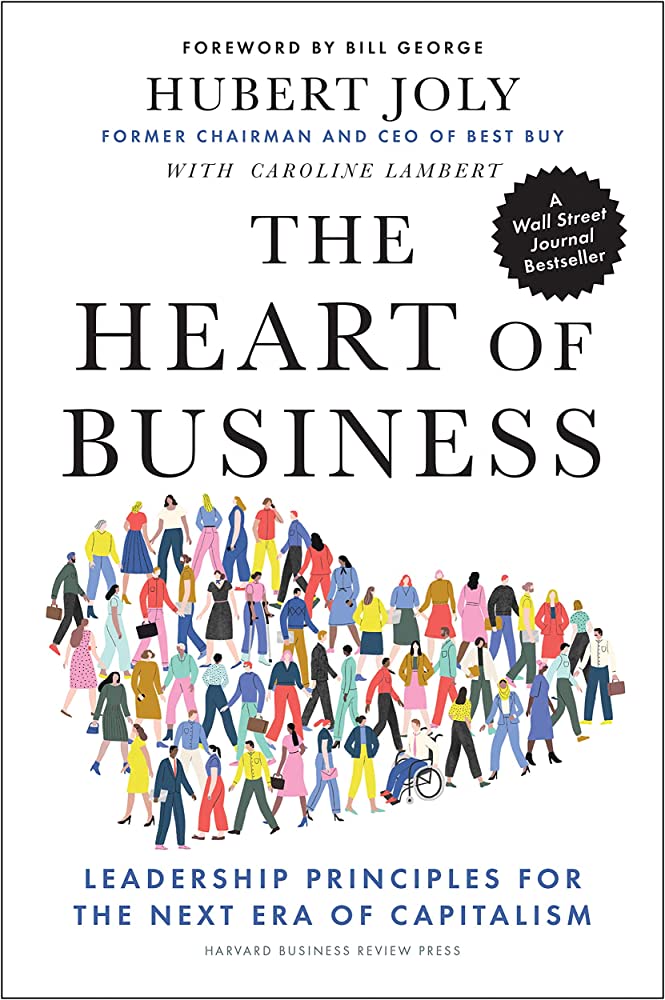“The Heart of Business: Leadership Principles for the Next Era of Capitalism”
By Hubert Joly
In his time as CEO of Best Buy (from 2012 to 2019), Hubert Joly turned a company that was headed for extinction into a thriving business poised to compete in the coming decades. He also learned in those years that so much of what he had been taught in business school and as a consultant and young executive is “either wrong, outdated or incomplete.” Companies that exclusively focus on making money and pressing employees to implement a strategic plan that is not meaningful to them, he says, almost always fail. It’s time for a new approach to capitalism that focuses on purpose and human connection, and Joly lays out what that would look like in his book, “The Heart of Business.”
First, leaders need to reexamine the meaning of work. Joly sees disengagement at work as a “global epidemic” and attributes the indifference to our culture’s tendency to view work as a chore to endure instead of the central avenue for creating meaning in our lives. When workers are disengaged from purpose, they don’t reach their full potential. Workplace cultures that emphasize profit over human connection only exacerbate this problem, incentivizing people to continue with systems and approaches that don’t work well, or to pursue “perfection” as defined by arbitrary standards — which only tanks morale.
Next Joly takes on a sacred cow: the notion that maximizing shareholder value is the central function of business. “Although making money is of course vital,” Joly says, “…considering profit the sole purpose of business is wrong for four fundamental reasons”:
- Profit is not a good measure of economic performance: It does not take into account the impact of business on the rest of society. A carbon footprint does not show up on the balance sheet, but it is a very real cost we all bear.
- An exclusive focus on profit is dangerous: It is too easy to rig the game of maximizing profit by doing things like underinvesting in people or raising prices. That short-term thinking has long-term costs.
- A singular focus on profit antagonizes customers and employees: Consumers and workers now expect companies to take responsibility for the role they must play in making social and environmental change.
- An obsessive focus on profit is not good for the soul: Maximizing shareholder value is never successful as a motivator for employees. They need to connect their work to meaning.
To move beyond the myopic fixation on profit, leaders need to focus on purpose and people. Companies that define a noble purpose have engaged employees, participate in thriving communities, delight their customers, treat their vendors as partners and reward their shareholders. These outcomes are interdependent on each other. During his tenure as CEO of Best Buy, the company’s purpose was to “enrich customers’ lives through technology.” Maximizing shareholder value was not the goal — it was one outcome of aligning all decisions around the central purpose.
Sounds easy enough, but the challenge comes in getting the purpose off the presentation slide and actually linking it to the company’s strategy. One way Best Buy did this was to turn the purpose into actual service offerings. They saw a need to help more seniors with their tech products, and to serve them in the context where they were most comfortable, at home. The company created Geek Squad “in-home advisors” offering “total tech support” to help people with all their devices, whether they had been purchased at Best Buy or not. This encouraged customers to develop a relationship with the Geek Squad members who served them, and the move vastly improved customer loyalty. Best Buy put serving people first, and it paid off.
Finally, Joly outlines his alternative to traditional management, “moving past carrots and sticks” to understand what drives your employees, foster human connection, create safe environments and promote diversity and inclusion. These are the factors that will unlock the massive potential in employees and get everyone rowing in the same direction to fulfill the company’s purpose.
How do you help employees achieve mastery? You give them autonomy and decision-making power, focus on effort over results, treat people as individuals, “coach” rather than train, treat learning as a lifelong journey and make space for failure.
In the business world, this new approach to leadership takes courage. But capitalism as we’ve long known it, Joly says, is broken. It’s time for a new approach to business that is more humane, sustainable and meaningful.

